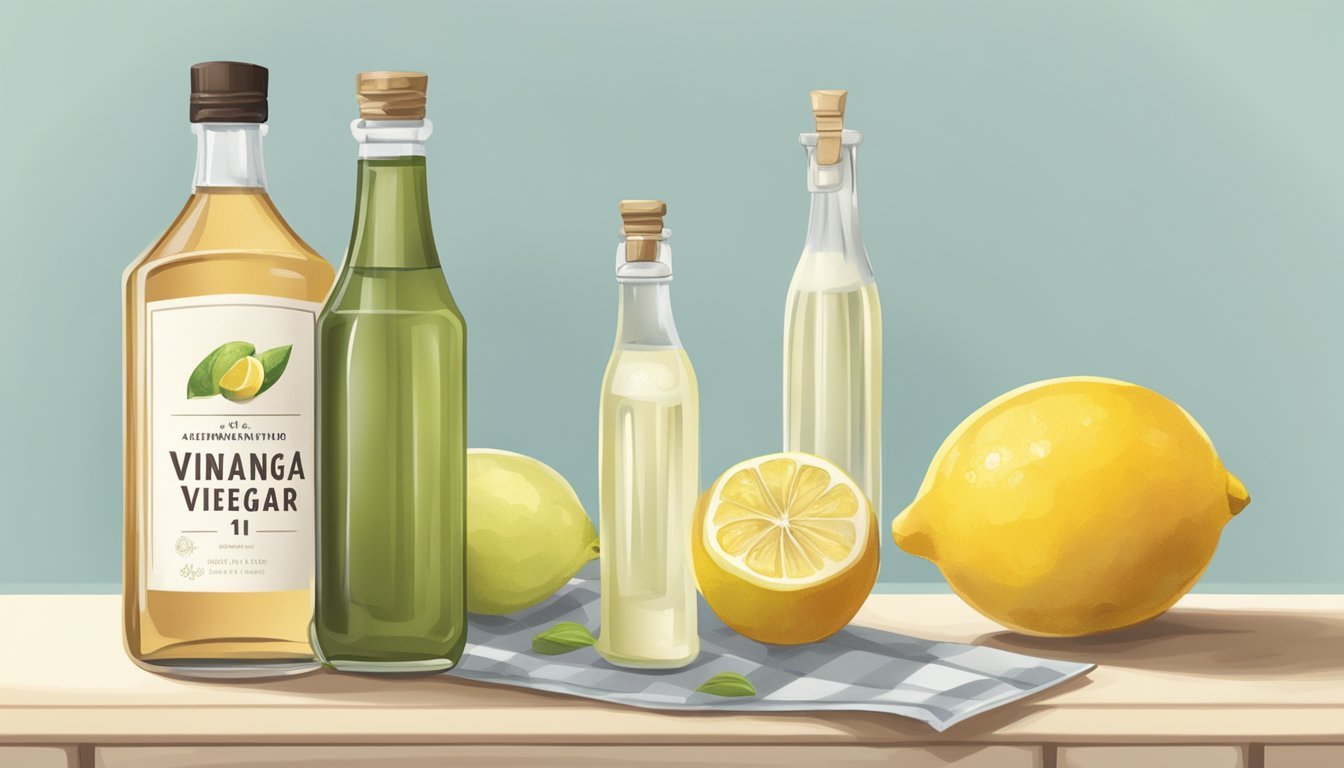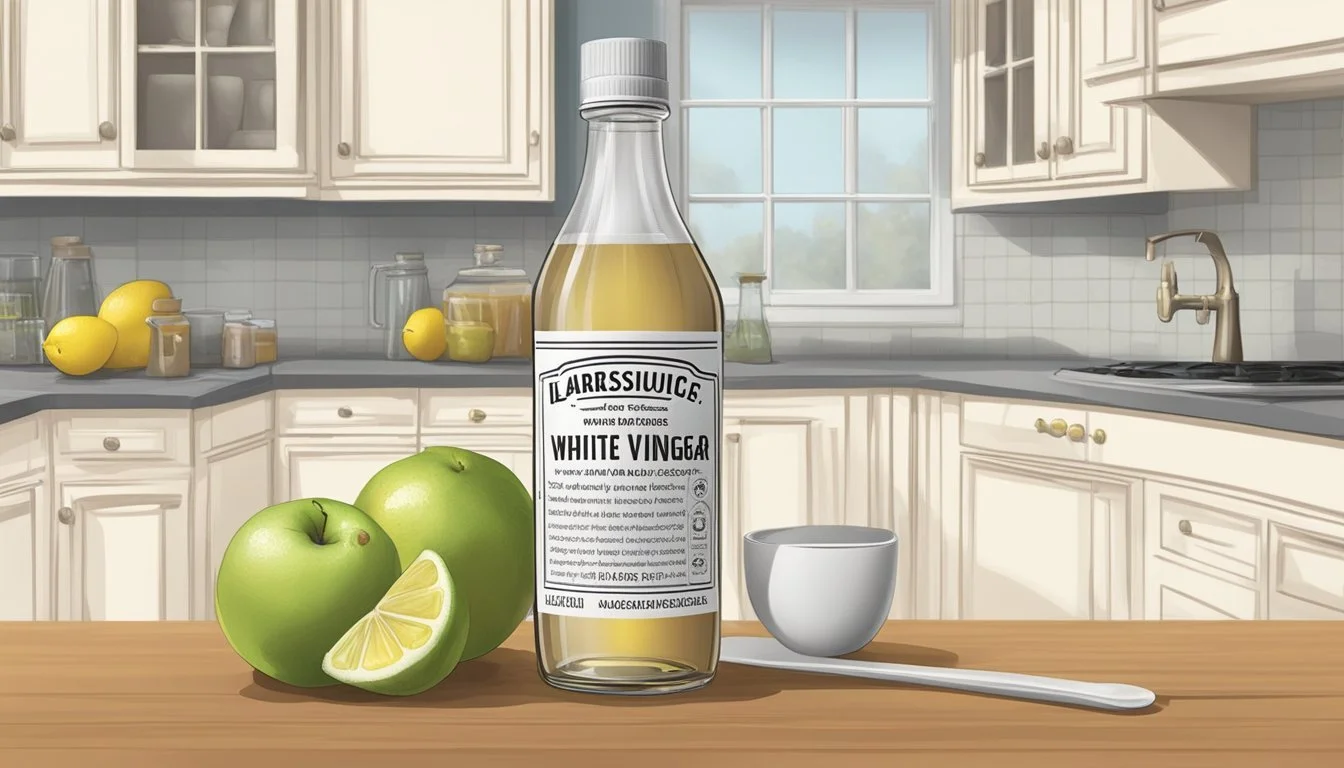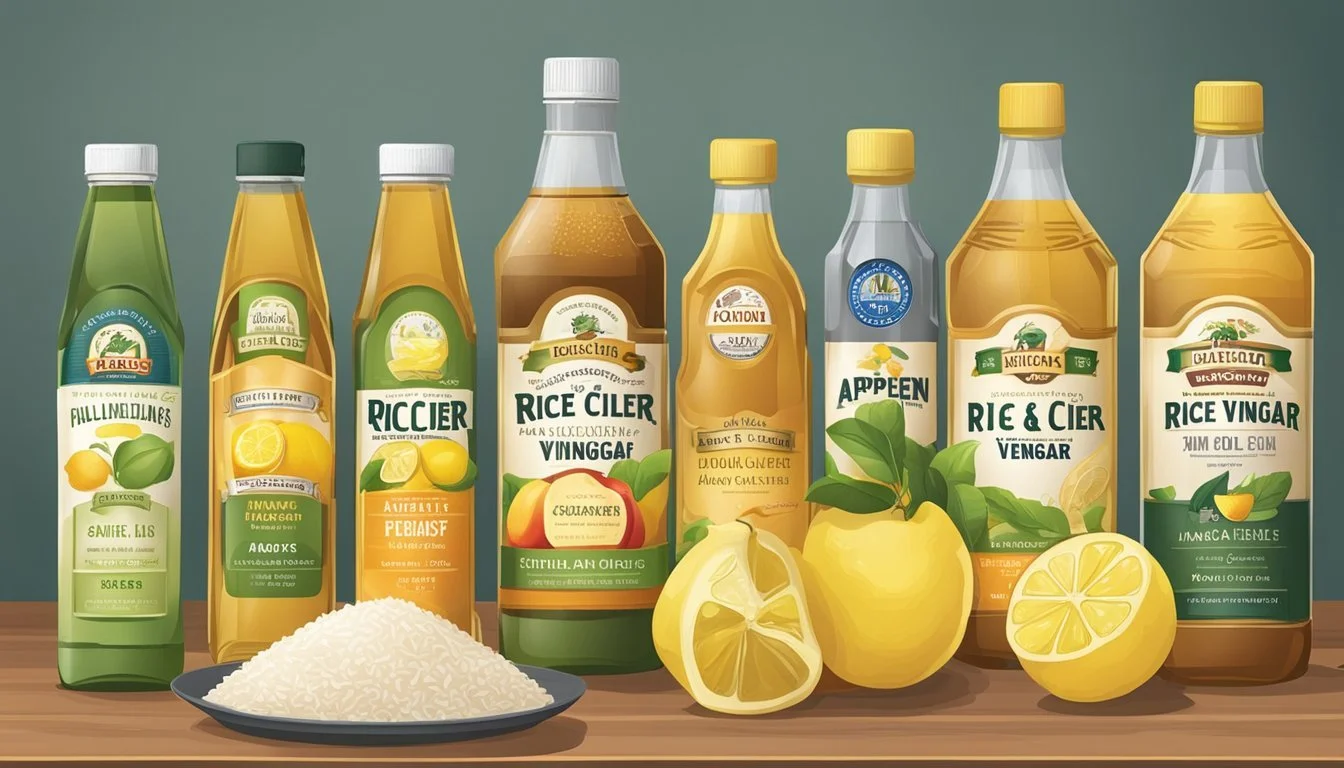White Vinegar Substitutes
Top Alternatives for Cooking and Cleaning
White vinegar is a staple ingredient found in pantries around the world, known for its sharp, acidic flavor that lends itself well to a variety of recipes, from marinades and salad dressings to cleaning solutions. However, there are instances when a cook may find the bottle empty or simply wish to experiment with different flavors. In such cases, knowing how to effectively substitute white vinegar without compromising the dish's integrity is crucial.
Several alternatives to white vinegar exist, each bringing its unique profile while still providing the acidity needed in cooking. Apple cider vinegar, for example, offers a milder taste with a slight apple flavor, making it an excellent substitute in most recipes that call for white vinegar. Similarly, lemon juice offers a fresh, citrusy zest and can be used in a one-to-one ratio, especially in recipes where a bright accent of flavor is welcome.
Moreover, for recipes requiring a more nuanced taste, balsamic vinegar can be used, though it is typically sweeter and has a more pronounced flavor. It's often suitable for dressings or reductions where its complexity can be a focal point. The versatility of these substitutes allows cooks to adapt to the absence of white vinegar seamlessly, ensuring that dishes maintain their desired flavor profiles.
Understanding Vinegar and Its Uses
Vinegar serves as a versatile staple in kitchens and for household use, recognized for its acidic properties that prove useful in a variety of applications.
Types of Vinegar
Vinegar comes in multiple forms, each distinct in its source and flavor profile. White vinegar, known for its strong acidity and clear color, is made from distilled grain alcohol, presenting a sharp taste. Vinegar's acidity content is usually around 4-7%, with white vinegar typically on the higher end of this range. Other common types include apple cider vinegar, which has a milder fruity taste and is excellent for dressings and marinades, and balsamic vinegar, known for its rich, sweet flavor, ideal for sauces and reductions.
Culinary Uses of Vinegar
In culinary contexts, vinegar is highly valued for its ability to enhance flavors and act as a preservative. It is a critical component in salad dressings, contributing acidity to balance oils and other seasonings. In marinades, vinegar's acid helps tenderize meats and infuse them with flavor, while in sauces and pickling, vinegar provides both a preservative effect and a distinct zest. When baking, certain recipes might call for vinegar to react with baking soda, promoting leavening.
Salad Dressings: Mix oil, vinegar, and seasonings for a simple vinaigrette.
Marinades: Combine vinegar with herbs and spices to prepare meats.
Sauces: Vinegar can deglaze pans or add a tangy component to sauces.
Pickling: Use it to create a brine that will preserve and flavor vegetables.
Vinegar in Cleaning and Other Non-Culinary Uses
Beyond the kitchen, vinegar's potent acidic nature makes it a useful cleaning agent. White vinegar, in particular, is often employed for its disinfectant qualities, effectively cutting through grease and mineral deposits. It's common to see vinegar used as a natural cleaner for glass, floors, and kitchen surfaces. Aside from cleaning, vinegar can also serve in gardening, to lower soil pH, and in laundry, as a fabric softener.
Cleaning: Dilute with water for a natural glass and surface cleaner.
Laundry: Add vinegar to the rinse cycle as a fabric softener.
Characteristics of White Vinegar
White vinegar is a staple in many kitchens, known for its clear color and versatile use in cooking due to its mild acidity level.
Flavor Profile of White Vinegar
White vinegar has a distinctly sour flavor which is both sharp and intense. It owes its flavor to acetic acid, making it a preferred ingredient when a clean, acid taste is desired without affecting the color of the food.
Acidity and Use in Recipes
With a typical acidity level of about 5%, white vinegar's moderate acid content makes it highly effective as a preservative in pickling recipes. It is also often used in marinades, salad dressings, and as a cleaning agent due to its disinfectant properties. In baking, its acidity can activate baking soda, which helps baked goods rise.
White Vinegar Alternatives
When white vinegar is unavailable or someone desires a different flavor or component for a recipe, numerous substitutes serve well in cooking and cleaning contexts.
Substitutes for Cooking
In the culinary world, there are several acidic liquids that can replace white vinegar. These substances should be chosen based on the desired flavor profile and acidity required for the dish.
Lemon Juice: With a similar level of acidity and a fresh, citrusy flavor, lemon juice can substitute white vinegar in equal parts in dressings, marinades, and baking.
Balsamic Vinegar: For a richer, slightly sweeter option, balsamic vinegar mixed with a quarter teaspoon of lemon juice for every tablespoon can be used.
Apple Cider Vinegar: Providing a mild apple flavor, it stands in well for white vinegar in most recipes. It’s particularly efficient when the dish calls for a subtle sweetness.
The key is to match the substitute's intensity and flavor to the original recipe's intent.
Substitutes for Cleaning
When it comes to cleaning, white vinegar is prized for its disinfectant properties and ability to break down grease. However, alternatives exist:
Lemon Juice: Its acidity makes it an effective natural cleaner and it can be used directly on surfaces or diluted in water.
Baking Soda and Water Solution: For a non-acidic, abrasive substitution, a paste made from baking soda and water can be used to scrub surfaces.
Always test these alternatives on a small, inconspicuous area first to ensure they do not damage the surface being cleaned.
Vinegar-Based Substitutes
When looking for alternatives to white vinegar, it's essential to consider the flavors and acidity levels that different types of vinegar can bring to a dish. Vinegar-based substitutes offer a range of options, each with a unique profile, ensuring that dishes retain their desired taste and balance.
Apple Cider Vinegar
Apple cider vinegar is made from fermented apple cider and has a milder taste with a subtle hint of apple. Its sweetness and fruitiness make it an excellent one-to-one substitute for white vinegar in marinades, salads, and pickling recipes.
White Wine Vinegar
White wine vinegar has a similar acidity level to white vinegar but brings a lighter, fruity flavor. It can substitute white vinegar in equal parts and is particularly suitable for sauces, dressings, and light-colored dishes.
Red Wine Vinegar
Red wine vinegar, derived from red wine, offers a robust flavor. It pairs well with red meat and can replace white vinegar in a 1:1 ratio, adding a deeper flavor profile to vinaigrettes and marinades.
Rice Vinegar
Rice vinegar, commonly used in Asian cuisine, has a delicate, sweet, and mild tartness. It is less acidic than white vinegar, and so it may be necessary to use a bit more when substituting to maintain the desired tang in dishes such as sushi or slaw.
Champagne Vinegar
Champagne vinegar, made from champagne, has a light and elegant taste. It is perfect for adding a touch of acidity without overwhelming the flavors of delicate dishes. Replace white vinegar with champagne vinegar in equal parts for a refined twist.
Sherry Vinegar
Sherry vinegar originates from the sherry wine and has a rich, nutty, and slightly sweet flavor. Its complexity enhances stews and reductions and can substitute white vinegar at a one-to-one ratio, keeping in mind it's more potent.
Balsamic Vinegar
Balsamic vinegar, known for its dark, concentrated, and intensely flavorful profile, is often used in reductions, glazes, and to add a burst of flavor to roasted vegetables. Swap it for white vinegar by mixing it with a small amount of lemon juice to mimic the acidity of white vinegar while imparting its distinctive taste.
Non-Vinegar-Based Substitutes
When seeking alternatives to white vinegar that don't involve other types of vinegar, one might consider citrus juices or other acidic liquids, including some that are fermented or naturally sweet. These substitutes can offer a similar tang or zest to dishes where vinegar is typically used.
Citrus Juice Alternatives
Citrus juices, like lemon juice and lime juice, are excellent non-vinegar substitutes for white vinegar due to their natural acidity and flavor profile. They can be used in a 1:1 ratio for most recipes, including dressings and marinades. Citrus juices not only provide the desired sourness but also add a fresh, zesty kick.
Substitution Example:
Replace 1 tablespoon of white vinegar with 1 tablespoon of lemon juice or lime juice.
Fermented Liquids
Some fermented liquids can mimic the acid levels needed in recipes that typically call for vinegar. Tamarind paste, which is made from a sour fruit, can be thinned out with water and used as a substitute. Additionally, malt vinegar, which is less acidic than white vinegar, could be replaced in recipes where its distinct flavor complements the dish.
Substitution Example:
To replace 1 tablespoon of white vinegar, dissolve a small amount of tamarind paste in water to match the liquid volume required.
Sweet Substitutes
In recipes where a mild acid and a hint of sweetness are desired, certain fruit juices can be suitable substitutes. These juices should be used when the tartness of vinegar is less integral to the taste profile of the dish.
Substitution Examples:
For salad dressings or sauces, one might replace vinegar with equal parts of apple or grapefruit juice, adjusting for sweetness if necessary.
Alternative Ingredients with Unique Tastes
Distinctive flavors can be introduced to recipes through the use of alternative vinegars that embody complex and nuanced tastes. These vinegars, often suffused with fruits or herbs, impart a character to dishes that white vinegar alone cannot achieve.
Herb-Infused Vinegars
Herb vinegars harness the aromatic qualities of various herbs, adding a layer of flavor to culinary creations. Rosemary and thyme are popular choices, often used to craft vinegars that bear a unique fragrance and a subtly complex taste. These herb-infused options not only contribute acidity but also bring the distinct essence of the herbs:
Rosemary Vinegar: offers a woody and lemony profile, suitable for marinades and dressings.
Tarragon Vinegar: imparts an anise-like, gently sweet flavor enjoyed in sauces or seafood dishes.
Thyme Vinegar: gives a sharp and almost minty edge, versatile in various recipes.
Herb vinegars work seamlessly in recipes where a delicate flavor is desired, without overwhelming the dish.
Fruit-Flavored Vinegars
Fruit vinegars, particularly raspberry vinegar, stand out for their ability to blend sourness with a hint of fruit sweetness. These vinegars can introduce a more complex and layered taste in food preparations. They are well suited for vinaigrettes, deglazing, or when a subtle fruit note is beneficial:
Raspberry Vinegar: Often favored for its sweet and tangy profile, it has a vibrant flavor that enhances salad dressings and sauces.
Fruit vinegars should be used thoughtfully, as they infuse a notable sour flavor alongside their fruity notes, which can significantly alter the character of a dish.
Substitutions for Specialized Use
When replicating the effects of white vinegar in specific culinary applications, choosing the right substitute can maintain or enhance the flavor profile and effectiveness of the recipe. Each substitution listed below caters to a particular use, ensuring both taste and function are addressed.
Wine and Vinegar for Marinades
For marinades, opting for wine vinegars can impart a depth of flavor not typically found in white vinegar. A 1:1 substitution of white wine vinegar works well for most marinade recipes requiring an acidic component, as it tenderizes the meat while adding a subtle vinosity. Red wine vinegar is suitable when a stronger flavor profile is desired.
Sweeteners in Salad Dressings
Replacing white vinegar with fruit-based vinegars or juices introduces a natural sweetness to salad dressings without the need for sugar. Balsamic vinegar can be used equal parts as an alternative and offers a rich, complex sweetness. Likewise, honey or grape juice, enhanced with a bit of lemon for acidity, can be mixed in to achieve the desired balance between sweet and tangy.
Substitutes for Preserving and Canning
For preserving and canning, the substitute must retain high acidity to prevent bacterial growth. Replacements like apple cider vinegar ensure safety and can be used in the same quantities as white vinegar. Pickling vegetables is particularly amenable to this substitute, as its slight fruity undertone complements the natural flavors of the produce.
Health-Conscious Substitutions
In the quest for health benefits such as reduced calorie intake or increased vitamin C, alternatives like lemon juice or lime juice offer viable substitutions. They can seamlessly replace white vinegar in recipes, providing a similar acidic punch with added nutritional value. These citrus juices can typically be swapped in equal measure and are especially fitting in light vinaigrettes and sauces.
Considerations for Substitution
When substituting white vinegar, one must carefully consider the taste, acidity balance, and visual impact the substitute will have on the recipe, as well as its availability.
Taste Adjustments
Substituting white vinegar may require different quantities to achieve the desired flavor profile. White wine vinegar can be a close match but often brings a fruity taste that might not be suitable for all dishes. It's crucial to start with a 1:1 ratio and adjust to taste, considering the substitute's unique flavor notes.
Acidity Balance
The acidity levels in white vinegar play a pivotal role in recipes, especially for pickling and marinades. Lemon juice and lime juice are excellent alternatives due to their similar acidity. However, one should note that some substitutes, like apple cider vinegar, could be milder and may require adjustment.
Color and Clarity in Recipes
White vinegar's clear color does not alter the appearance of dishes. Substitutes like balsamic vinegar, although flavorful, could change the color of a recipe. For a substitute that maintains clarity, one should opt for white wine vinegar as it is typically light in color.
Availability of Substitutes
Most vinegar substitutes are easy to find in a home kitchen or local store; however, some, like white wine vinegar, can be more expensive. One should consider the availability and cost before deciding on a substitution.
By keeping these aspects in mind, chefs and home cooks alike can confidently select the best alternatives for white vinegar and achieve desired results in their culinary creations.
Utilizing Substitutes in Recipes
When a recipe calls for white vinegar and it's unavailable, one can successfully use a substitute by understanding the correct quantities and ratios along with the appropriate cooking techniques.
Adjusting Quantities and Ratios
Citrus Juices: Lemon or lime juice can replace white vinegar in recipes such as salads and vinaigrettes using a 1:1 ratio, as their acidity levels are comparable. However, one should add these citrus juices gradually and taste adjust to avoid overpowering the dish.
Apple Cider Vinegar: A popular substitute, apple cider vinegar, brings a touch of sweetness and can be used in equal amounts as white vinegar. It’s especially suitable for bbq sauce and glazes where its fruity undertones complement the overall flavor profile.
Balsamic Vinegar: For a depth of flavor in salads or marinades, balsamic vinegar can be used in a 1:1 ratio, but due to its inherent sweetness, it may be necessary to balance it out with a bit of extra acidity or reduce other sweet ingredients in the recipe.
Cooking Techniques With Substitutes
Marinating: When using substitutes in marinating processes, it is essential to consider the flavor profile of the substitute as this will be imparted to the ingredient being marinated.
Preservation: For pickling or other preservation methods, one must ensure that the substitute has a similar acidity level as white vinegar, which typically has around 5% acetic acid, to prevent bacterial growth.
Baking: In baking, the substitute needs to not only have a similar acid profile for leavening but also a flavor that complements the baked good. Lemon juice is often suitable for this purpose.







